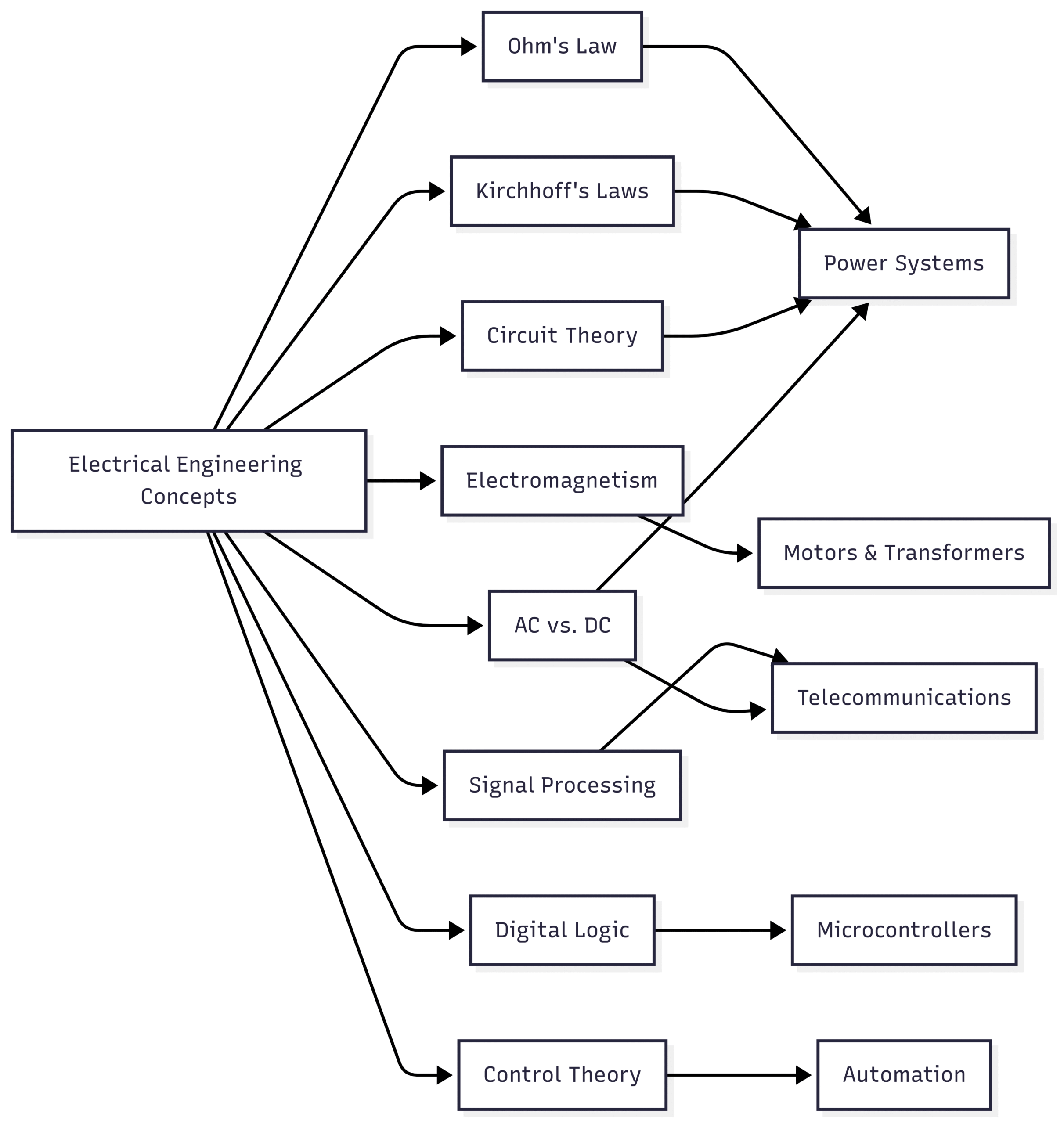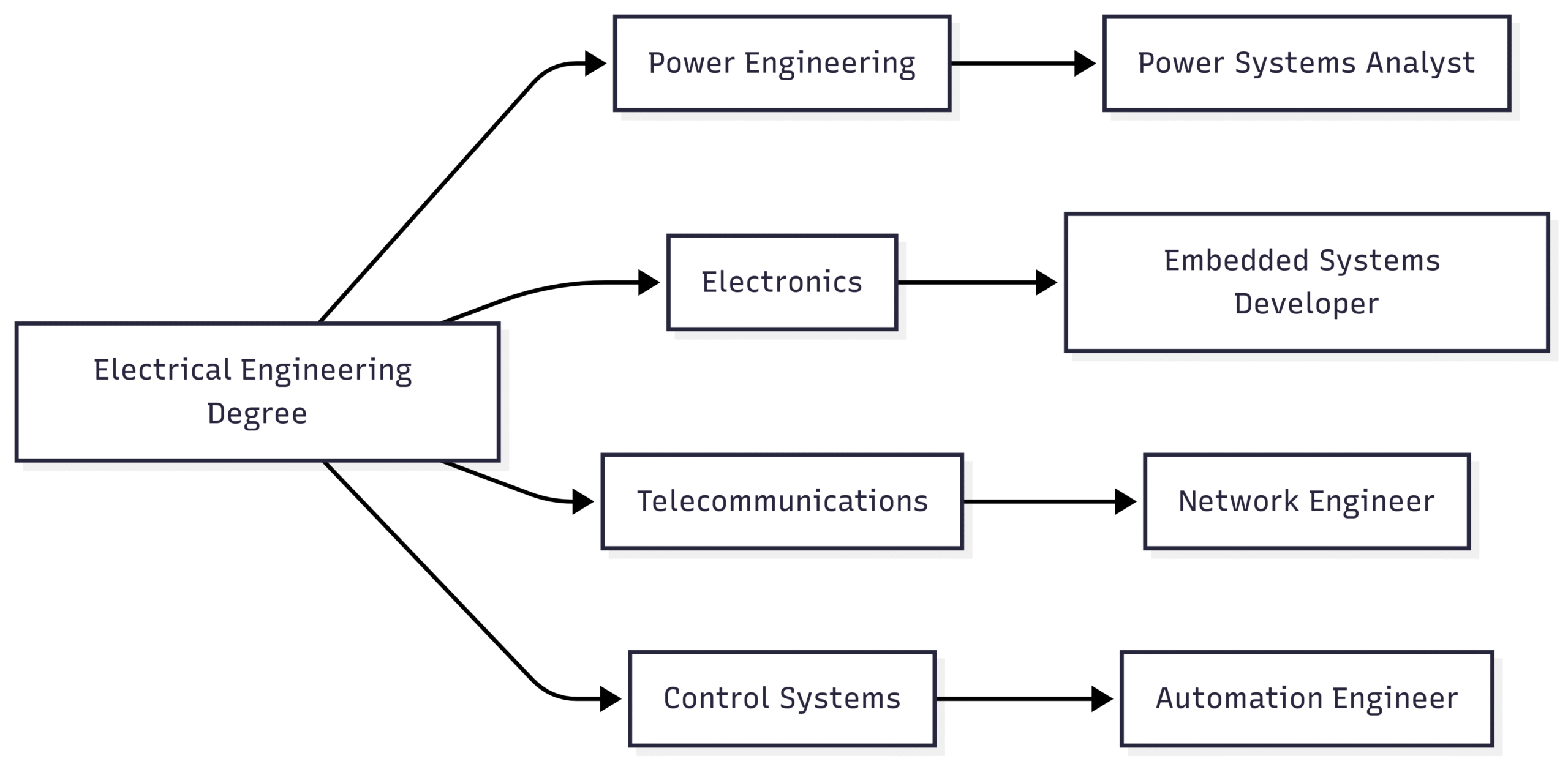What are concepts every electrical engineer SHOULD know?
Master essential electrical engineering concepts like Ohm’s Law, circuit analysis, and electromagnetism to excel in power systems, electronics, and more.
Electrical engineering powers modern society, driving innovations in energy, communication, and automation. For students and professionals, mastering core concepts is critical to solving real-world challenges and advancing technology. This article explores the foundational principles every electrical engineer should know, practical applications, and actionable resources for building expertise. Designed for clarity and depth, it addresses the needs of third-year students, like the original poster, and professionals seeking to solidify their knowledge.
The Importance of Core Electrical Engineering Concepts
Electrical engineering blends mathematics, physics, and practical application to design systems that deliver energy, process signals, and automate processes. A strong grasp of fundamentals enables engineers to analyze circuits, troubleshoot issues, and innovate solutions. For students feeling overwhelmed or behind, as expressed in the Reddit post, these concepts are not just academic—they are the bedrock of a successful career. Professionals emphasize that while college provides a foundation, on-the-job learning and continuous study refine expertise.
Understanding these principles ensures engineers can:
- Design reliable and efficient systems.
- Troubleshoot complex issues in real-world applications.
- Adapt to emerging technologies like smart grids and IoT.
- Collaborate effectively in multidisciplinary teams.
Foundational Concepts in Electrical Engineering
Below are the core concepts every electrical engineer should master, with explanations tailored to both students and early-career professionals.
1. Ohm’s Law
Ohm’s Law (V = IR) defines the relationship between voltage (V), current (I), and resistance (R). It’s the cornerstone of circuit analysis, enabling engineers to predict how circuits behave. For example, in a circuit with a 12V battery and a 4Ω resistor, the current is:
[ I = \frac{V}{R} = \frac{12}{4} = 3A ]
Why it matters: Ohm’s Law is universal, from simple LED circuits to complex power systems. Professionals stress its practical use in troubleshooting, like ensuring components operate within safe current limits.
2. Kirchhoff’s Laws
Kirchhoff’s Current Law (KCL) and Voltage Law (KVL) are essential for analyzing complex circuits:
- KCL: The sum of currents entering a node equals the sum leaving it.
- KVL: The sum of voltage drops around a closed loop equals zero.
These laws allow engineers to solve for unknown voltages and currents in multi-component circuits. For instance, KCL is critical in power distribution to ensure balanced loads.
Real-world application: Relay field engineers, as noted by a Reddit user, use KCL/KVL to verify circuit designs in substations.
3. Circuit Theory
Circuit theory encompasses techniques like nodal analysis, mesh analysis, and Thevenin’s/Norton’s theorems. It explains how components (resistors, capacitors, inductors) interact in AC and DC circuits.
Key distinction:
- DC Circuits: Use steady currents, common in battery-powered devices.
- AC Circuits: Handle time-varying signals, vital for power grids and signal processing.
Why it’s critical: A Reddit commenter emphasized that circuit fundamentals are non-negotiable, as they underpin nearly all electrical engineering disciplines.
4. Electromagnetism
Electromagnetism governs the interaction of electric and magnetic fields, foundational for motors, transformers, and generators. Maxwell’s equations describe these phenomena mathematically, but engineers focus on practical applications like:
- Induction: How transformers step up/down voltages.
- Magnetic fields: Driving motor rotation.
Industry relevance: Power engineers, as mentioned in the Reddit thread, rely on electromagnetism for designing efficient transformers and motors.
5. Signal Processing
Signal processing manipulates analog or digital signals to extract information or improve quality. It’s crucial in telecommunications, audio systems, and control systems. Key concepts include:
- Frequency Response: How systems react to different signal frequencies.
- Fourier Transform: Decomposes signals into frequency components.
Example: A Reddit user asked about frequency response, highlighting its importance in audio and communication systems.
6. Digital Logic and Memory Systems
Digital logic uses binary signals (0s and 1s) to design circuits like microprocessors. Key elements include:
- Logic Gates: AND, OR, NOT gates form the basis of digital circuits.
- Memory Systems: Store data in registers, RAM, or ROM.
Practical use: Microcontrollers, as recommended by Reddit users, rely on digital logic for automation and embedded systems.
7. Control Theory
Control theory designs systems to regulate outputs, using feedback loops (open or closed). Proportional-Integral-Derivative (PID) controllers are common in automation.
Application: In power systems, control theory ensures stable voltage output despite load changes, as noted by a power engineer on Reddit.
8. AC vs. DC
Understanding the differences between alternating current (AC) and direct current (DC) is vital:
- AC: Varies sinusoidally, used in power grids (e.g., 120V at 60Hz in the US).
- DC: Constant, used in electronics like smartphones.
Why it matters: A Reddit user struggled with AC power calculations (e.g., P = VImax(1 + cos(ωt + δ))), underscoring the need to master AC concepts.
Chart: Core Concepts and Their Applications

Applications in Industry
Electrical engineering concepts find applications across diverse fields, as highlighted by Reddit users and the original article:
- Power Engineering: Involves generation, transmission, and distribution. Engineers design systems to deliver electricity efficiently, using three-phase systems and smart grids. A relay field engineer on Reddit emphasized short circuit analysis and symmetrical components for substation reliability.
- Electronics: Focuses on circuit design for consumer devices. Understanding transistors and op-amps, as noted by a commenter, is key.
- Telecommunications: Designs networks using signal processing and communication protocols (e.g., I²C, SPI).
- Control Systems: Automates processes, from industrial robotics to HVAC systems, using PID controllers and PLCs.
- Microelectronics: Involves designing tiny components like ICs, requiring knowledge of semiconductors.
- Instrumentation: Develops measurement tools, relying on circuit theory and signal processing.
Table: Key Concepts and Industry Applications
| Concept | Industry Application | Example Use Case |
|---|---|---|
| Ohm’s Law | Power Systems, Electronics | Calculating resistor values for LEDs |
| Kirchhoff’s Laws | Power Systems, Circuit Design | Analyzing substation circuits |
| Circuit Theory | All Fields | Designing amplifiers or filters |
| Electromagnetism | Power Engineering, Motors | Optimizing transformer efficiency |
| Signal Processing | Telecommunications, Audio Systems | Noise reduction in communication systems |
| Digital Logic | Microelectronics, Embedded Systems | Programming microcontrollers |
| Control Theory | Automation, Robotics | Stabilizing power plant output |
| AC vs. DC | Power Systems, Electronics | Designing AC power grids or DC circuits |
For Students: Building a Strong Foundation
The Reddit poster’s anxiety about lacking basics is common among third-year students. Here’s how to address it:
Academic Foundations
- Mathematics: Master calculus, differential equations, and linear algebra for circuit analysis and signal processing.
- Physics: Understand electromagnetism and mechanics to grasp component behavior.
- Circuit Analysis: Practice nodal and mesh analysis to build intuition.
Hands-On Learning
- Lab Work: Build circuits on breadboards, as suggested by Reddit users. Start with simple LED circuits, then progress to transistors and microcontrollers.
- Simulation Tools: Use LTSpice or Multisim to simulate circuits before building them.
- Kits: An Elegoo or Arduino kit (priced ~$30-$60 on Amazon) provides components for experimentation.
Recommended Resources
- Books:
- Learning the Art of Electronics by Hayes: Covers practical circuit design.
- Electronic Devices by Floyd: Includes Multisim examples.
- Fast & Effective Embedded Systems by Toulson: Teaches microcontroller programming.
- YouTube Channels:
- Ben Eater: Breadboarding and digital logic tutorials.
- EEVBlog: Electronics basics and troubleshooting.
- Brian Douglas: Control theory explanations.
- GreatScott: Power electronics projects.
- Online Platforms:
- Spires Online Tutors: Personalized tutoring for circuit analysis and math.
- Khan Academy: Free math and physics courses.
- All About Circuits: Tutorials and forums for beginners.
Practical Tips
- Start Small: Build a simple circuit (e.g., resistor-LED with a 9V battery) to understand Ohm’s Law.
- Read Datasheets: As suggested by a Reddit user, learn to interpret component datasheets for practical design.
- Practice Problems: Solve circuit problems from textbooks to reinforce concepts.
For Professionals: Applying and Expanding Knowledge
Professionals, like the relay field engineer on Reddit, emphasize continuous learning and specialization:
Workplace Essentials
- Circuit Analysis: Understand AC/DC circuits and impedance for troubleshooting.
- Programming: Basic skills in C/C++ or Python for embedded systems.
- Soft Skills: Problem-solving, teamwork, and communication, as highlighted by Reddit users, are critical in collaborative projects.
- Safety Standards: Adhere to NEC and IET guidelines, especially in power engineering.
Specialization
- Power Engineering: Focus on transformers, relays, and load flow analysis.
- Electronics: Deepen knowledge of transistors and op-amps.
- Control Systems: Master PLCs and PID controllers.
Continuous Learning
- Industry Publications: Read EDN and EETimes for updates on components and trends.
- Certifications: Pursue Fundamentals of Engineering (FE) or Professional Engineer (PE) exams for credibility.
- Workshops: Attend seminars on smart grids or IoT to stay current.
Addressing Common Concerns
The Reddit poster’s fear of forgetting basics, like what a resistor does, reflects a broader concern about readiness. Professionals reassure that:
- No One Knows Everything: As a commenter noted, engineers are “bibliography consultant machines.” Google and datasheets are tools to refresh knowledge.
- Practical Experience Builds Confidence: Hands-on projects, like those using Arduino, cement understanding.
- Imposter Syndrome is Normal: Many students and early-career engineers feel inadequate, but persistence leads to growth.
Table: Recommended Tools and Costs
| Tool | Purpose | Approx. Cost |
|---|---|---|
| Elegoo Starter Kit | Prototyping circuits | $35 |
| Arduino Uno | Microcontroller projects | $25 |
| Multimeter | Measuring voltage, current, resistance | $20-$50 |
| Breadboard | Circuit prototyping | $5-$10 |
| LTSpice | Circuit simulation | Free |
Career Pathways and Skills
Graduates can pursue roles like:
- Network Engineer: Designs telecom systems (~$80,000/year average salary, US).
- Power Systems Analyst: Optimizes energy distribution (~$90,000/year).
- Embedded Systems Developer: Programs microcontrollers (~$85,000/year).
Key Skills:
- Technical: Circuit design, programming, signal analysis.
- Transferable: Problem-solving, teamwork, project management.
Professional Development:
- IET Accreditation: Validates degree quality for global recognition.
- CPD: Workshops and certifications keep skills current.
Chart: Career Pathways

Final Thoughts
Mastering electrical engineering fundamentals—Ohm’s Law, Kirchhoff’s Laws, circuit theory, and more—equips engineers to innovate and solve real-world problems. For students, hands-on practice and resources like Ben Eater’s videos or Spires Online Tutors build confidence. Professionals emphasize continuous learning and specialization to stay relevant. As the Reddit poster learned, it’s never too late to strengthen your foundation. Embrace the challenge, experiment, and keep learning to thrive in this dynamic field.
Happy Boating!
Share What are concepts every electrical engineer SHOULD know? with your friends and leave a comment below with your thoughts.
Read Understanding the Basics of Marine Engineering until we meet in the next article.






